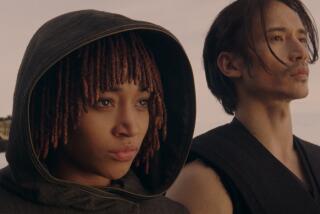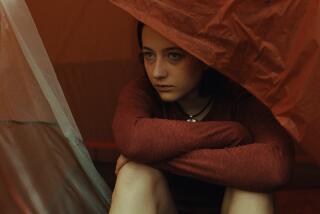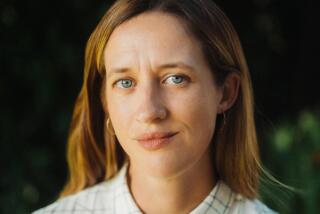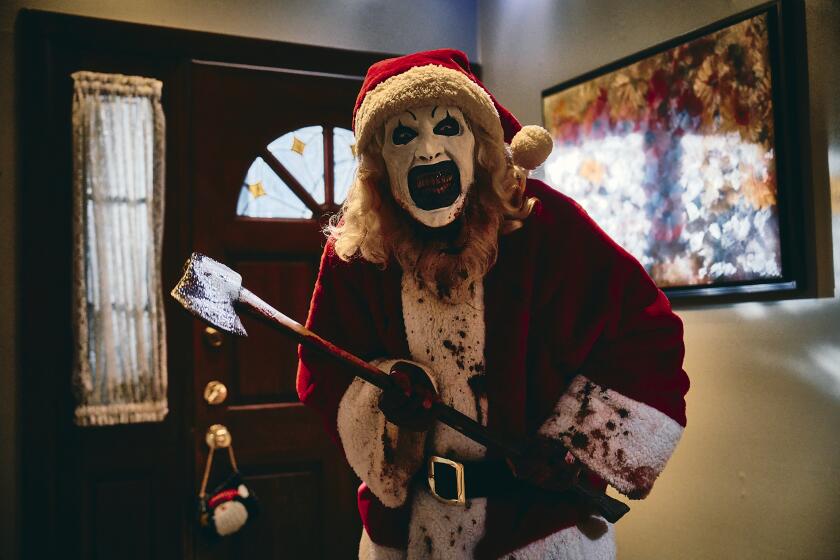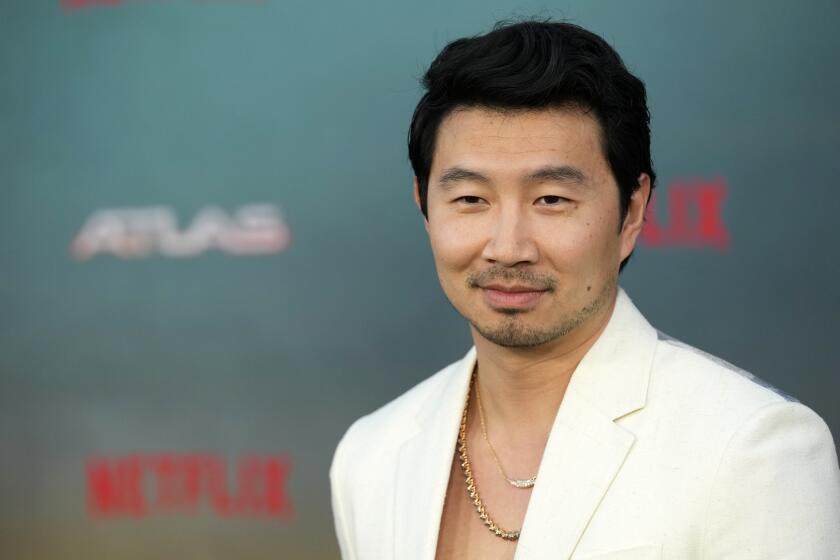The genesis of ‘Rogue One,’ the first ‘Star Wars’ you might not want to take your kid to

Walt Disney Co.’s “Rogue One: A Star Wars Story” premiered at the Pantages Theater in Hollywood on Dec. 10. The film could gross $300 million worldwide over its opening weekend.
For nearly 40 years, the “Star Wars” franchise has been targeted at all ages, from the youngest padawans to the most grizzled Jedi masters. Speaking to The Times in 1977, shortly before the release of “A New Hope,” George Lucas said he thought of the film — which was initially rated G until its studio backers asked for a less kiddie-sounding PG — as “a movie Disney would have made when Walt Disney was alive,” sagely predicting, “If I make money, it will be from the toys.”
The latest installment in the franchise, “Rogue One: A Star Wars Story,” which hits theaters Dec. 16, is something a bit different. As the title suggests, it’s gone slightly rogue.
The story of a secret Rebel mission to steal the plans to the Empire’s Death Star, “Rogue One” is the first film in the franchise that truly leans into the “wars” in “Star Wars,” featuring a kind of visceral violence, un-glossy naturalism and moral complexity unlike anything ever seen before in Lucas’ space opera. The film carries the same PG-13 rating as last year’s “The Force Awakens,” but you’d have to reach back to 1980’s “The Empire Strikes Back” to find a “Star Wars” movie this darkly hued.
“We pushed it,” director Gareth Edwards said of the film’s grittiness and intensity. “We pushed it all the way to the edge, probably went off the edge a little bit and then came back.”
Make no mistake — an army of Stormtroopers couldn’t keep kids away from “Rogue One.” And odds are most will love it and drag their parents directly to the nearest toy store to stock up on action figures and miniature space ships.
Still, those behind the film caution that it may be a bit much for the kinds of preschool-aged tots for whom the sight in “Return of the Jedi” of a teddy bear-like Ewok being killed by the blast of an Imperial walker may have been horrifying enough.
“I think ‘Rogue One’ might be a little hardcore for really young kids,” said cast member Riz Ahmed, who plays a cargo pilot named Bodhi Rook. He laughed. “Having said that, I saw ‘Nightmare on Elm Street’ when I was 6, so what am I talking about? Take your babies!”
Industrial Light and Magic Chief Creative Officer John Knoll, who served as the film’s visual effects supervisor, said a great deal of thought went into how far to push the edginess of “Rogue One.” And, as the one who initially conceived the idea for the story in the first place more than a decade ago, he would know as well as anyone.

Watch the trailer for “Rogue One: A Star Wars Story.”
We spoke to Knoll earlier this month at the Lucasfilm headquarters in San Francisco about the initial seeds of “Rogue One,” how it creatively evolved and what Lucas thinks of the film.
How did this idea first come up?
During the shooting of [2005’s] “Episode III” in Sydney, I was on set supervising the visual-effects plate shooting, and Jonathan Rinzler, who was the editor of LucasBooks at the time, mentioned George and [producer] Rick [McCallum] were developing this live-action “Star Wars” TV show.
I started thinking, “What kind of fun stories would you want to tell as episodes of a one-hour live-action show?” That was when I first thought, “What if we elaborated on what’s mentioned in the opening crawl of [‘A New Hope’] about the spy mission to steal the Death Star plans?” I thought it could be kind of a fun “Mission: Impossible”-style [story].
A few days later, I chatted with Rick and he told me a little bit about the TV series, about what the themes were and the year it took place. I realized this idea had no place in that and I just dropped it.
It wasn’t until Kathy [Lucasfilm President Kathleen Kennedy] came on board Lucasfilm [in 2012] and this new slate of “Star Wars” films were announced — including these standalone movies that aren’t necessarily connected to that main through-line — that it occurred to me that the stealing-the-Death-Star-plans idea could be a pretty good feature film on its own.
The news of this slate of new films was much discussed around the hallways here, so I’d be having lunch with a friend and I’d say, “Imagine SEAL Team Six in the Star Wars universe.”
I got such favorable responses that each time I told this pitch, it started to get a little more elaborate: What’s the arc? Who are these characters?
A friend of mine here said, “You really have to pitch this to Kathy.” And I realized, “Boy, if I don’t I’ll always wonder what would have happened.”
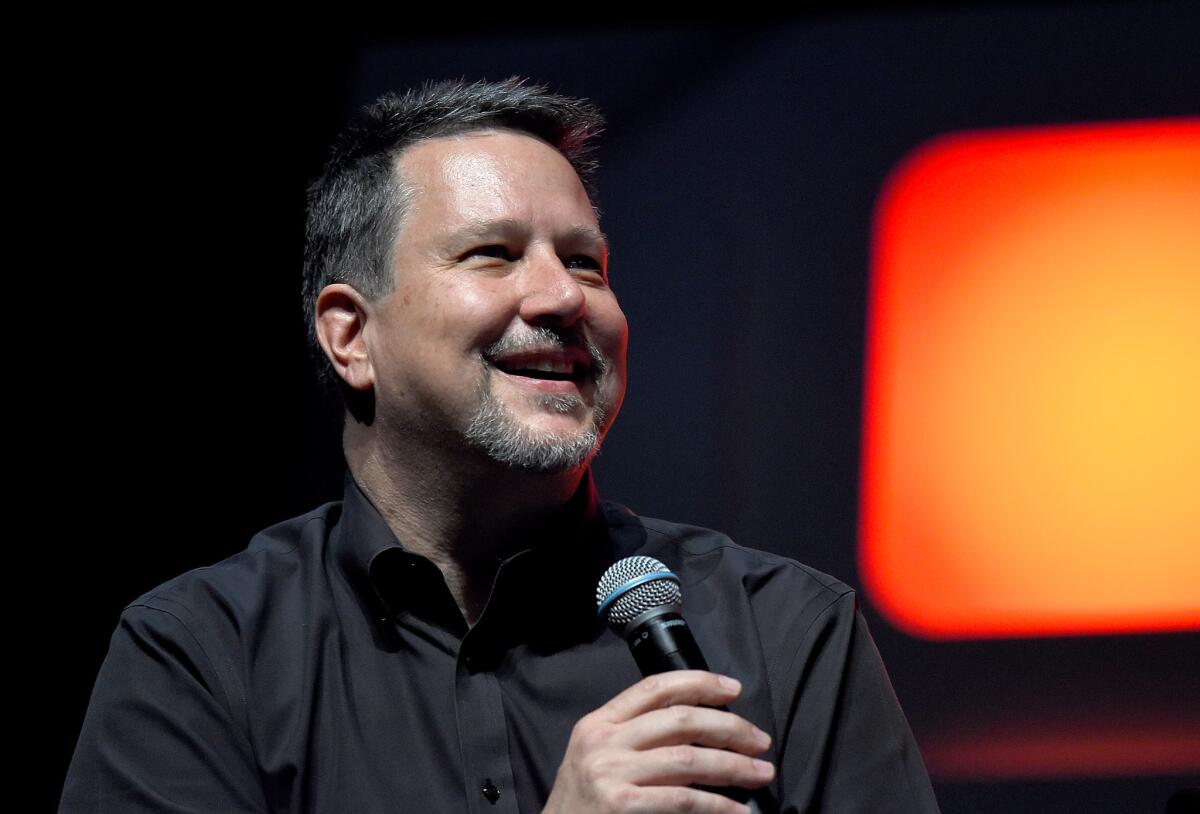
How did that meeting go?
I suspect Kathy was a little dubious. I think she feared the flood of employees rushing to her with: “Wait, I have a ‘Star Wars’ movie too!” But she humored me, and I got a meeting with her and Kiri Hart, who’s head of the [Lucasfilm] story group.
At the end of it, Kathy said, “Alright, I’m impressed, thank you.” And it kind of snowballed from there.
This is a grittier, darker “Star Wars” movie than we’ve seen at least since “Empire.” How did you guys arrive at that tone?
Kathy [told] us that these standalone movies can have a little more freedom to do genre and style experiments. “Rogue One” was envisioned as sort of a spy thriller/war mission movie. And Kathy mentioned the other day that the [planned standalone] Han Solo movie is going to be a bit more of a Western in terms of structure and tone. I love that. I think it’s really cool we can do these experiments in this giant playground.
Gareth wanted to do “Rogue One” as a more gritty and realistic war film. Everything was about, “What can we do to inject more realism into this?” We thought, “That would actually be interesting and fun to break away from a style in the ‘Star Wars’ universe where the shots are all super-carefully composed and there’s a bit of an artifice to it.”
When Gareth goes into a scene, he’s shooting it like a documentary in a way. I think 50% of the coverage in the movie is hand-held. That certainly poses a lot of challenges for the visual effects because often we don’t know what’s going into a shot until it’s being shot.
But there’s something wonderful about that. When there are those fantastic elements in there — when we put in the backgrounds and the vehicles — it feels like they were just there and we happened to capture it.
A lot of older fans will love the idea of a “Star Wars” movie inspired by Vietnam War and World War II films, but a major part of the audience is obviously kids. What kinds of conversations were there about where to draw the line?
That was definitely something we talked about a lot, and I say thanks to Kathy to give us this space to try something different. We didn’t feel like we needed to make sure everything was super-safe in this. We could try being a little bit more violent in parts of it and aiming for a little bit older audience than some of the previous films. I actually wouldn’t recommend taking 4-year-old kids to this movie.
It must be especially interesting for George Lucas to see what you guys did with “Rogue One” since, in the “Star Wars” timeline, this movie runs directly into what he did in “A New Hope.”
Yeah, I got a call last week from George right after he came out of a screening and he was very happy. He said it looked gorgeous and he thought we matched into the aesthetic very well. He feels like we’ve honored the legacy of everything he built all those years ago. We were pleased on that score.
Twitter: @joshrottenberg
ALSO
Review: ‘Rogue One’ adds an uneven but thrilling wrinkle to the mythology of ‘Star Wars’
‘Rogue One’ reactions land after the star-studded ‘Star Wars’ premiere party
More to Read
Only good movies
Get the Indie Focus newsletter, Mark Olsen's weekly guide to the world of cinema.
You may occasionally receive promotional content from the Los Angeles Times.
